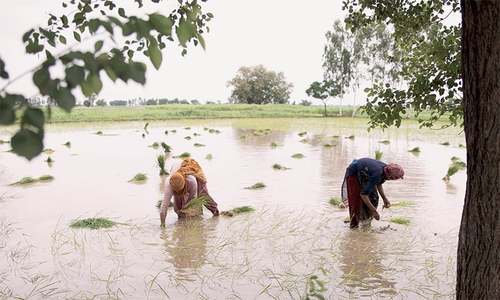ABAD Khan stands on the edge of his fields in Nowshera Virkan, a town known for its aromatic, long-grain basmati rice to the west of Gujranwala, looking over his new crop on a September afternoon. The overall average temperatures have dropped but the day feels quite warm — something the basmati growers like Khan should be worried about. To them a warmer weather means early flowering of their rice plants and seed fertility issues.
Some parts of the basmati belt along the Chenab are already under pest attack. The attack, according to him, has so far been observed only in small patches along the basmati belt — Narowal, Sialkot, Gujranwala, Hafizabad and Sheikhupura. But he feels it could spread because the pest is resisting the insecticides like anything and multiple sprays in some areas have failed to kill the insect.
However, climate change and pest attacks are not the only worries for him. India has applied for exclusive GI (Geographical Indications) tag for its basmati rice at the European Union’s official registry, the Council on Quality Schemes for Agricultural Products and Food Stuffs. The EU subsequently published the application of India in its official journal on September 11, showing basmati rice as an India-origin product despite the fact that similar rice is widely produced in Pakistan. To protect its own brand of basmati, Pakistan has a few weeks before December 10 to challenge the Indian claim.
“If the Indians managed to secure GI tag from the EU for their basmati crop, it will be devastating for our growers and exporters,” Khan asserts, elaborating that the drop in the basmati rice exports will result in lower prices for the farmers. “Once India gets the exclusive GI tag, we will not be able to market our rice in the international market as basmati; we would be wholly dependent on the Indian firms and brands to sell our product in the global markets.”
At present, India has 65 per cent and Pakistan 35pc share in the world basmati rice trade.
A GI is a sign used on agricultural products that have specific geographical origin and possess qualities or reputation that are due to that origin. Geographical Indications are part of the intellectual property rights (IPRs). GI tags help boost sales and exports as the geographical limitation on production and official recognition of historical and cultural significance increase the demand and create a legacy.
The news of India staking an exclusive claim to basmati rice has also shocked Pakistan’s rice exporters as basmati rice exports fetch between $800 million and $1 billion a year. “Pakistan exports basmati rice to many countries. A chunk of our basmati exports is shipped to the EU countries. Should India secure the GI tag for its basmati rice, the consumers will start preferring the [recognised] Indian product. It will drastically harm our market share in EU. Hence, the issue is of crucial importance for us,” says Sameeullah, a rice exporter from Lahore.
“India cannot have exclusive right on the basmati trademark when it is a joint heritage. A GI tag is granted on the basis of geographical origin of an agricultural product and qualities associated with the soil of that region or territory,” he asserts, contending that Pakistan’s rice is way better than India’s in every respect.
Khan says India’s move has come as a surprise to him. “Pakistan had an understanding with India that the two countries would jointly apply for the exclusive GI tag because basmati rice is our shared heritage since it is grown for centuries by both of them in areas along the Chenab. GI has more to do with soil than history, on the basis of which India has applied for exclusive tag from the EU. Our case for exclusive GI tag for our basmati rice is much stronger than India’s.”
Both India and Pakistan had fought jointly in the late 1990s and the early 2000s to foil the attempt by a Texas-based company, RiceTec, to patent basmati rice in the US. After losing the battle, the company named its rice brand as Texmati.
Khan is critical of the government’s indifference towards growers’ plight. “It is unfortunate that our government has never shown interest in protecting our heritage. When India tried to make a case for GI tagging for its super basmati rice some years back, our farmers took the initiative under the banner of the Basmati Growers Association and challenged the move in Indian courts in Chennai and New Delhi. Our government never supported us financially or technically nor did it provide us legal support. Resultantly, we lost our case in the Chennai court. We are unable to pursue the other case in New Delhi because we do not have resources to pay for the lawyers’ fee and other expenses. You cannot fight such issues alone; you always need government’s help in every possible way.”
Sameeullah is also not happy with the government. “It is not that the government was unaware of the New Delhi’s plans. India had been working on it for many years and already declared Haryana, Himachal Pradesh, Uttar Pradesh and (some districts of) Jammu and Kashmir as part of its basmati belt. We had our Geographical Indications (Registration and Protection) Act 2020 passed from the parliament in March this year to claim our right to the geographical origin for our products. But since then no movement has so far been made to operationalise the law. Even our trade representative in Brussels has not done anything so far.”
With less than 70 days left to challenge and prepare Pakistan’s case, we may soon be gifting Pakistan’s basmati rice to the Indian firms if the government doesn’t change its behaviour and take immediate action to file objections to India’s claim for exclusive GI tag.
Published in Dawn, October 4th, 2020














































